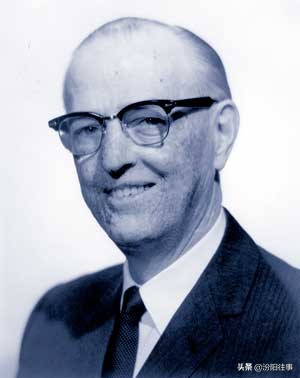
Walter H. Judd
About Walter H. Judd
Walter H. Judd was born on September 25, 1898 in Rising City, Nebraska (population 499). He received his medical degree from the University of Nebraska-Omaha in 1923. Judd soon felt the call for public service. He left China in the summer of 1925 and spent five years at a church hospital in Shaowu, southern China, caring for the sick and dying. After suffering from 44 episodes of malaria, Judd was forced to return to the United States in 1931 to recuperate.
He then began a three-year surgical fellowship at the Mayo Clinic. In 1932, Judd married Miriam Louise Barber. Born in India to YMCA workers, Miriam received the same missionary calling as Walter.
In 1934, Judd was appointed president of Fenzhou Hospital, and the Judd family (now with a daughter) moved to northern China. Another daughter was born in China, and the third daughter was on the way to Fenzhou by the Japanese army. In February 1938, four months before Fincho was captured by the Japanese, Judd took his pregnant wife and two daughters on a plane to the United States. Judd worked under Japanese surveillance for five months before being released.
He returned to the United States as a staunch fighter, giving 1,400 speeches in 46 states over the next two years, warning Japan not to assemble its forces. In 1941, the Judd family moved to Minneapolis, and Dr. Judd resumed practicing medicine. While the country's attention was focused on events in Europe, Judd continued to warn of an impending crisis in the Far East. As Judd predicted, the Japanese attacked Pearl Harbor. Because of his vast knowledge of the Far East, Judd was encouraged to run for the Fifth District Congress. He was elected in 1942 and served for 20 years. He was appointed Delegate to the United Nations General Assembly in 1957 and to the World Health Assembly in 1950 and 1958. He is considered a potential vice presidential candidate for Eisenhower and Nixon. He delivered a keynote address at the Republican National Convention in 1960. Judd is deeply loved by both parties — he was elected by his peers in 1961 as one of the ten most influential and respected members of Congress, the only Republican on the roster. Judd played a key role in congress approving the Truman Doctrine, the Marshall Plan, and NATO, drafting legislation for the World Health Organization and the International Emergency Response Fund for Children. The McAllen-Walter Act of 1952 included Judd's amendments to eliminate racial discrimination in immigration and naturalization laws.
After re-election, Judd lost his re-election campaign in 1962. He maintains a strict lecture schedule, giving lectures on public affairs, China, foreign policy, religion, and morality. He has also served as chairman of the judicial committee of the prestigious American Medical Association, a contributing editor of Reader's Digest, and chairman of the Free China Committee. In 1981, Judd received the Presidential Medal of Freedom, the highest civilian award in the United States.
A book about Walter H. Judd
- Lee Edwards, The Free Missionary, 1990.
- Lee Edwards' Walter W. Bush H. Judd, 1995.
- Walter H. Judd: A Chronicle of Politicians, Walter Judd, Edward J. Rozek, eds., 1980.
- "The Minnesota Ten and U.S. Foreign Policy, 1989-1968," Barbara Stuhler, 1973.